Role Concepts: An Analysis of 5 Ways to Listen Effectively
VerifiedAdded on 2021/12/13
|7
|1576
|37
Essay
AI Summary
This essay delves into the critical role of effective listening in both personal and professional contexts, highlighting how a lack of attentive listening can lead to misunderstandings and conflicts. Drawing from a TED video, the assignment outlines five key strategies for enhancing listening skills: practicing silence, discerning various sounds, adjusting listening positions, and employing the RASA technique (Receive, Appreciate, Summarize, Ask). The author reflects on a personal experience to underscore the importance of attentive listening and emphasizes how the discussed techniques can improve relationships and decision-making. The essay concludes by reinforcing the significance of listening in human interaction and advocating for the cultivation of listening skills from a young age, suggesting practical exercises for improving listening abilities in various environments.
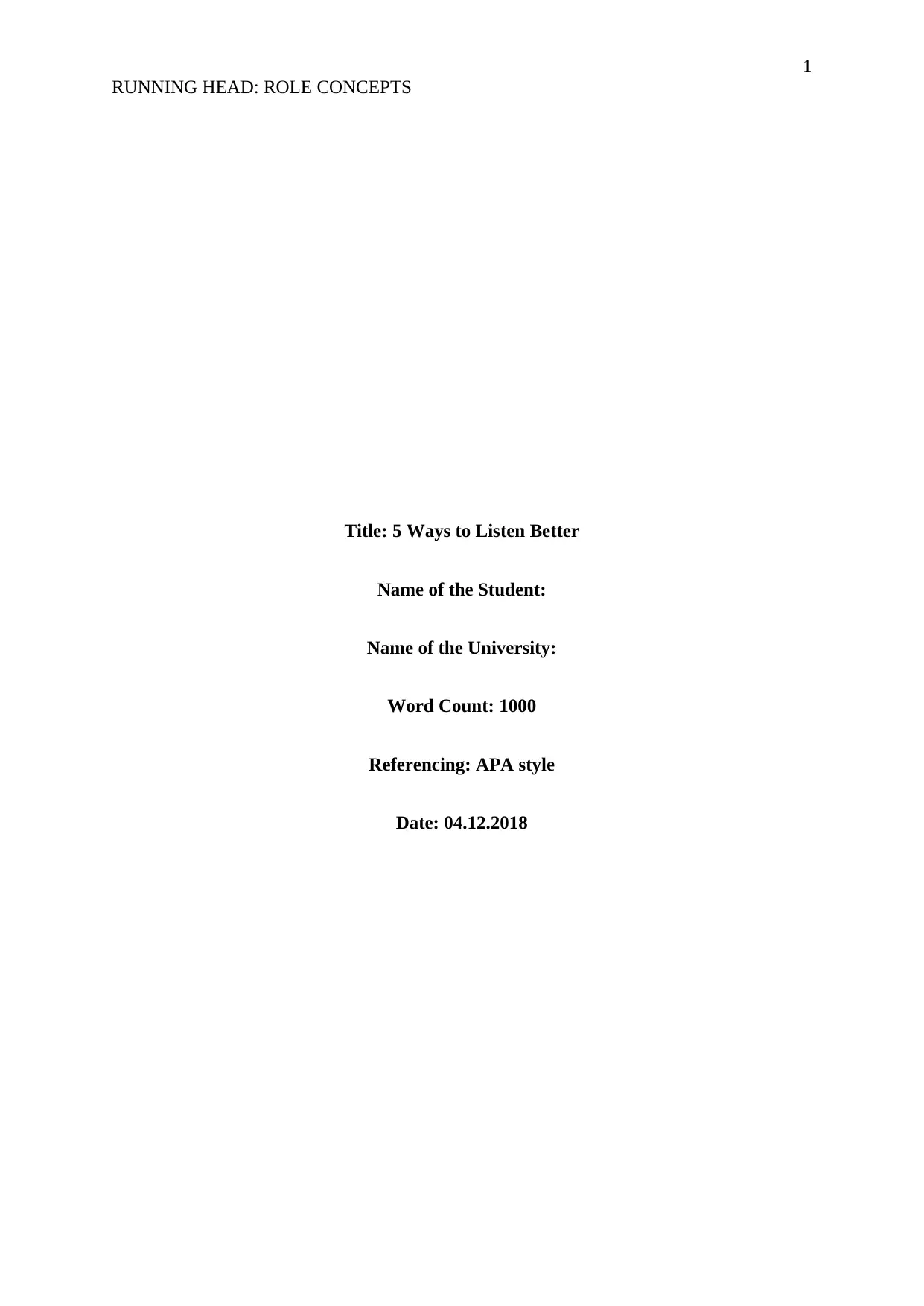
1
RUNNING HEAD: ROLE CONCEPTS
Title: 5 Ways to Listen Better
Name of the Student:
Name of the University:
Word Count: 1000
Referencing: APA style
Date: 04.12.2018
RUNNING HEAD: ROLE CONCEPTS
Title: 5 Ways to Listen Better
Name of the Student:
Name of the University:
Word Count: 1000
Referencing: APA style
Date: 04.12.2018
Paraphrase This Document
Need a fresh take? Get an instant paraphrase of this document with our AI Paraphraser
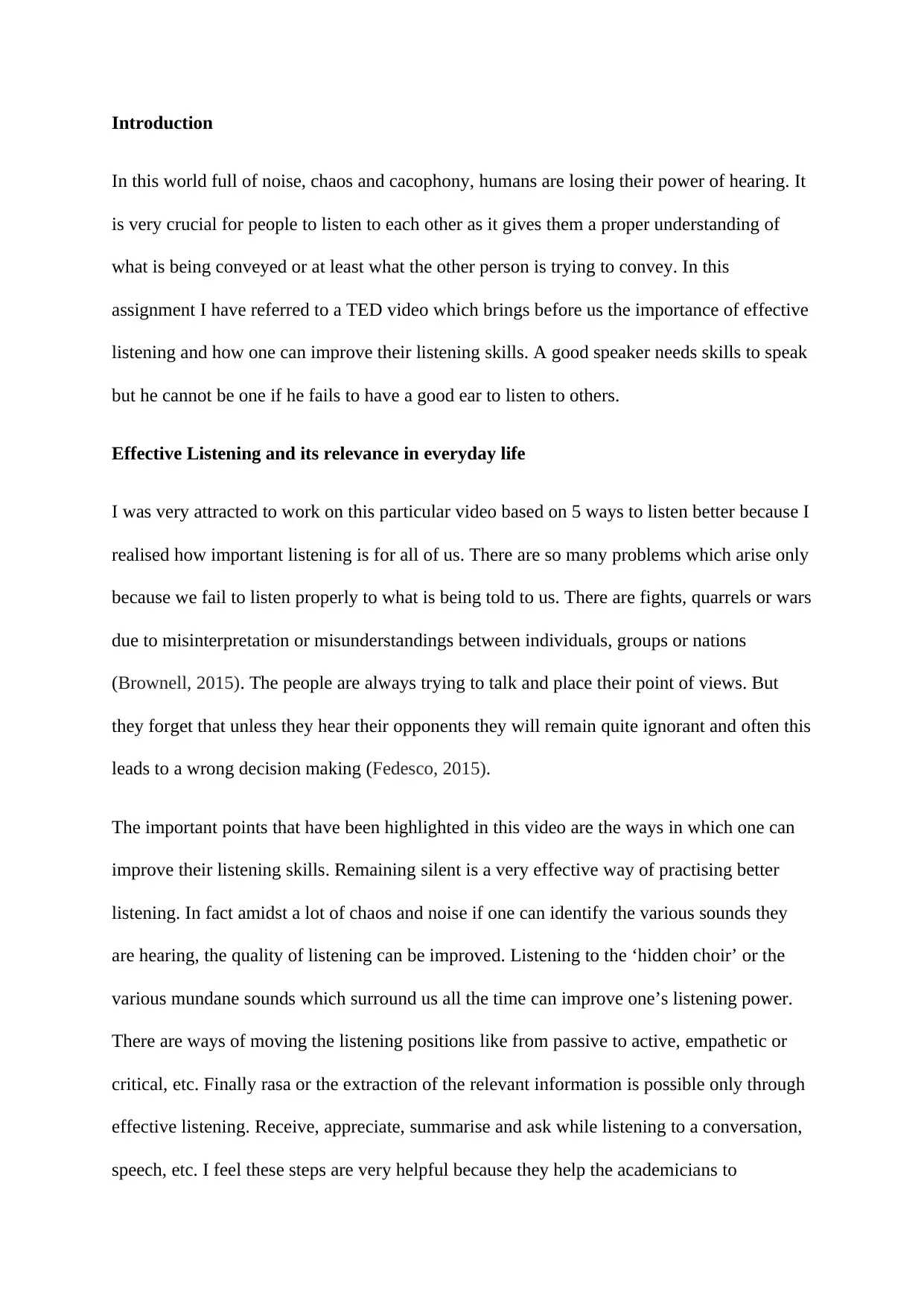
Introduction
In this world full of noise, chaos and cacophony, humans are losing their power of hearing. It
is very crucial for people to listen to each other as it gives them a proper understanding of
what is being conveyed or at least what the other person is trying to convey. In this
assignment I have referred to a TED video which brings before us the importance of effective
listening and how one can improve their listening skills. A good speaker needs skills to speak
but he cannot be one if he fails to have a good ear to listen to others.
Effective Listening and its relevance in everyday life
I was very attracted to work on this particular video based on 5 ways to listen better because I
realised how important listening is for all of us. There are so many problems which arise only
because we fail to listen properly to what is being told to us. There are fights, quarrels or wars
due to misinterpretation or misunderstandings between individuals, groups or nations
(Brownell, 2015). The people are always trying to talk and place their point of views. But
they forget that unless they hear their opponents they will remain quite ignorant and often this
leads to a wrong decision making (Fedesco, 2015).
The important points that have been highlighted in this video are the ways in which one can
improve their listening skills. Remaining silent is a very effective way of practising better
listening. In fact amidst a lot of chaos and noise if one can identify the various sounds they
are hearing, the quality of listening can be improved. Listening to the ‘hidden choir’ or the
various mundane sounds which surround us all the time can improve one’s listening power.
There are ways of moving the listening positions like from passive to active, empathetic or
critical, etc. Finally rasa or the extraction of the relevant information is possible only through
effective listening. Receive, appreciate, summarise and ask while listening to a conversation,
speech, etc. I feel these steps are very helpful because they help the academicians to
In this world full of noise, chaos and cacophony, humans are losing their power of hearing. It
is very crucial for people to listen to each other as it gives them a proper understanding of
what is being conveyed or at least what the other person is trying to convey. In this
assignment I have referred to a TED video which brings before us the importance of effective
listening and how one can improve their listening skills. A good speaker needs skills to speak
but he cannot be one if he fails to have a good ear to listen to others.
Effective Listening and its relevance in everyday life
I was very attracted to work on this particular video based on 5 ways to listen better because I
realised how important listening is for all of us. There are so many problems which arise only
because we fail to listen properly to what is being told to us. There are fights, quarrels or wars
due to misinterpretation or misunderstandings between individuals, groups or nations
(Brownell, 2015). The people are always trying to talk and place their point of views. But
they forget that unless they hear their opponents they will remain quite ignorant and often this
leads to a wrong decision making (Fedesco, 2015).
The important points that have been highlighted in this video are the ways in which one can
improve their listening skills. Remaining silent is a very effective way of practising better
listening. In fact amidst a lot of chaos and noise if one can identify the various sounds they
are hearing, the quality of listening can be improved. Listening to the ‘hidden choir’ or the
various mundane sounds which surround us all the time can improve one’s listening power.
There are ways of moving the listening positions like from passive to active, empathetic or
critical, etc. Finally rasa or the extraction of the relevant information is possible only through
effective listening. Receive, appreciate, summarise and ask while listening to a conversation,
speech, etc. I feel these steps are very helpful because they help the academicians to
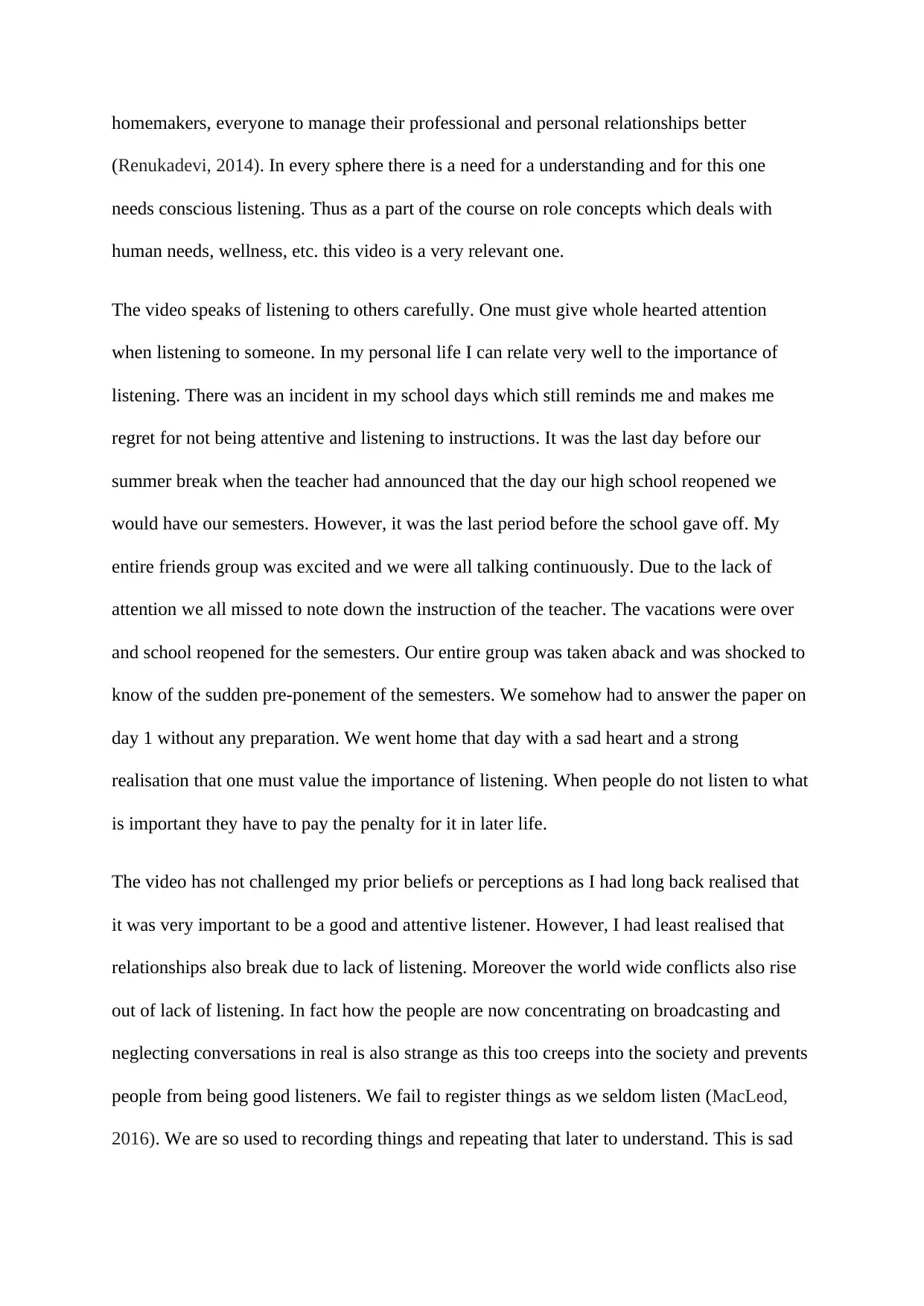
homemakers, everyone to manage their professional and personal relationships better
(Renukadevi, 2014). In every sphere there is a need for a understanding and for this one
needs conscious listening. Thus as a part of the course on role concepts which deals with
human needs, wellness, etc. this video is a very relevant one.
The video speaks of listening to others carefully. One must give whole hearted attention
when listening to someone. In my personal life I can relate very well to the importance of
listening. There was an incident in my school days which still reminds me and makes me
regret for not being attentive and listening to instructions. It was the last day before our
summer break when the teacher had announced that the day our high school reopened we
would have our semesters. However, it was the last period before the school gave off. My
entire friends group was excited and we were all talking continuously. Due to the lack of
attention we all missed to note down the instruction of the teacher. The vacations were over
and school reopened for the semesters. Our entire group was taken aback and was shocked to
know of the sudden pre-ponement of the semesters. We somehow had to answer the paper on
day 1 without any preparation. We went home that day with a sad heart and a strong
realisation that one must value the importance of listening. When people do not listen to what
is important they have to pay the penalty for it in later life.
The video has not challenged my prior beliefs or perceptions as I had long back realised that
it was very important to be a good and attentive listener. However, I had least realised that
relationships also break due to lack of listening. Moreover the world wide conflicts also rise
out of lack of listening. In fact how the people are now concentrating on broadcasting and
neglecting conversations in real is also strange as this too creeps into the society and prevents
people from being good listeners. We fail to register things as we seldom listen (MacLeod,
2016). We are so used to recording things and repeating that later to understand. This is sad
(Renukadevi, 2014). In every sphere there is a need for a understanding and for this one
needs conscious listening. Thus as a part of the course on role concepts which deals with
human needs, wellness, etc. this video is a very relevant one.
The video speaks of listening to others carefully. One must give whole hearted attention
when listening to someone. In my personal life I can relate very well to the importance of
listening. There was an incident in my school days which still reminds me and makes me
regret for not being attentive and listening to instructions. It was the last day before our
summer break when the teacher had announced that the day our high school reopened we
would have our semesters. However, it was the last period before the school gave off. My
entire friends group was excited and we were all talking continuously. Due to the lack of
attention we all missed to note down the instruction of the teacher. The vacations were over
and school reopened for the semesters. Our entire group was taken aback and was shocked to
know of the sudden pre-ponement of the semesters. We somehow had to answer the paper on
day 1 without any preparation. We went home that day with a sad heart and a strong
realisation that one must value the importance of listening. When people do not listen to what
is important they have to pay the penalty for it in later life.
The video has not challenged my prior beliefs or perceptions as I had long back realised that
it was very important to be a good and attentive listener. However, I had least realised that
relationships also break due to lack of listening. Moreover the world wide conflicts also rise
out of lack of listening. In fact how the people are now concentrating on broadcasting and
neglecting conversations in real is also strange as this too creeps into the society and prevents
people from being good listeners. We fail to register things as we seldom listen (MacLeod,
2016). We are so used to recording things and repeating that later to understand. This is sad
⊘ This is a preview!⊘
Do you want full access?
Subscribe today to unlock all pages.

Trusted by 1+ million students worldwide
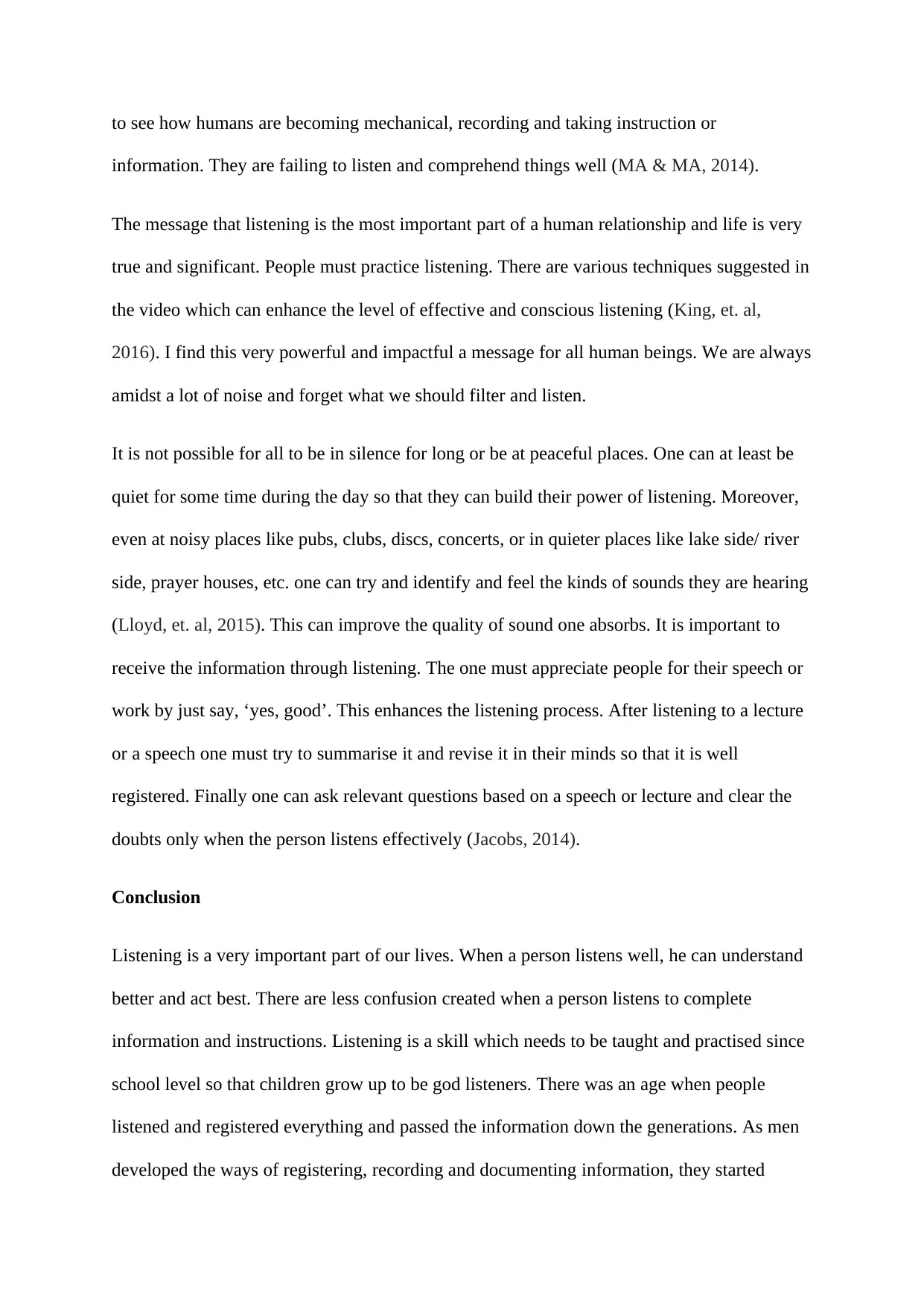
to see how humans are becoming mechanical, recording and taking instruction or
information. They are failing to listen and comprehend things well (MA & MA, 2014).
The message that listening is the most important part of a human relationship and life is very
true and significant. People must practice listening. There are various techniques suggested in
the video which can enhance the level of effective and conscious listening (King, et. al,
2016). I find this very powerful and impactful a message for all human beings. We are always
amidst a lot of noise and forget what we should filter and listen.
It is not possible for all to be in silence for long or be at peaceful places. One can at least be
quiet for some time during the day so that they can build their power of listening. Moreover,
even at noisy places like pubs, clubs, discs, concerts, or in quieter places like lake side/ river
side, prayer houses, etc. one can try and identify and feel the kinds of sounds they are hearing
(Lloyd, et. al, 2015). This can improve the quality of sound one absorbs. It is important to
receive the information through listening. The one must appreciate people for their speech or
work by just say, ‘yes, good’. This enhances the listening process. After listening to a lecture
or a speech one must try to summarise it and revise it in their minds so that it is well
registered. Finally one can ask relevant questions based on a speech or lecture and clear the
doubts only when the person listens effectively (Jacobs, 2014).
Conclusion
Listening is a very important part of our lives. When a person listens well, he can understand
better and act best. There are less confusion created when a person listens to complete
information and instructions. Listening is a skill which needs to be taught and practised since
school level so that children grow up to be god listeners. There was an age when people
listened and registered everything and passed the information down the generations. As men
developed the ways of registering, recording and documenting information, they started
information. They are failing to listen and comprehend things well (MA & MA, 2014).
The message that listening is the most important part of a human relationship and life is very
true and significant. People must practice listening. There are various techniques suggested in
the video which can enhance the level of effective and conscious listening (King, et. al,
2016). I find this very powerful and impactful a message for all human beings. We are always
amidst a lot of noise and forget what we should filter and listen.
It is not possible for all to be in silence for long or be at peaceful places. One can at least be
quiet for some time during the day so that they can build their power of listening. Moreover,
even at noisy places like pubs, clubs, discs, concerts, or in quieter places like lake side/ river
side, prayer houses, etc. one can try and identify and feel the kinds of sounds they are hearing
(Lloyd, et. al, 2015). This can improve the quality of sound one absorbs. It is important to
receive the information through listening. The one must appreciate people for their speech or
work by just say, ‘yes, good’. This enhances the listening process. After listening to a lecture
or a speech one must try to summarise it and revise it in their minds so that it is well
registered. Finally one can ask relevant questions based on a speech or lecture and clear the
doubts only when the person listens effectively (Jacobs, 2014).
Conclusion
Listening is a very important part of our lives. When a person listens well, he can understand
better and act best. There are less confusion created when a person listens to complete
information and instructions. Listening is a skill which needs to be taught and practised since
school level so that children grow up to be god listeners. There was an age when people
listened and registered everything and passed the information down the generations. As men
developed the ways of registering, recording and documenting information, they started
Paraphrase This Document
Need a fresh take? Get an instant paraphrase of this document with our AI Paraphraser
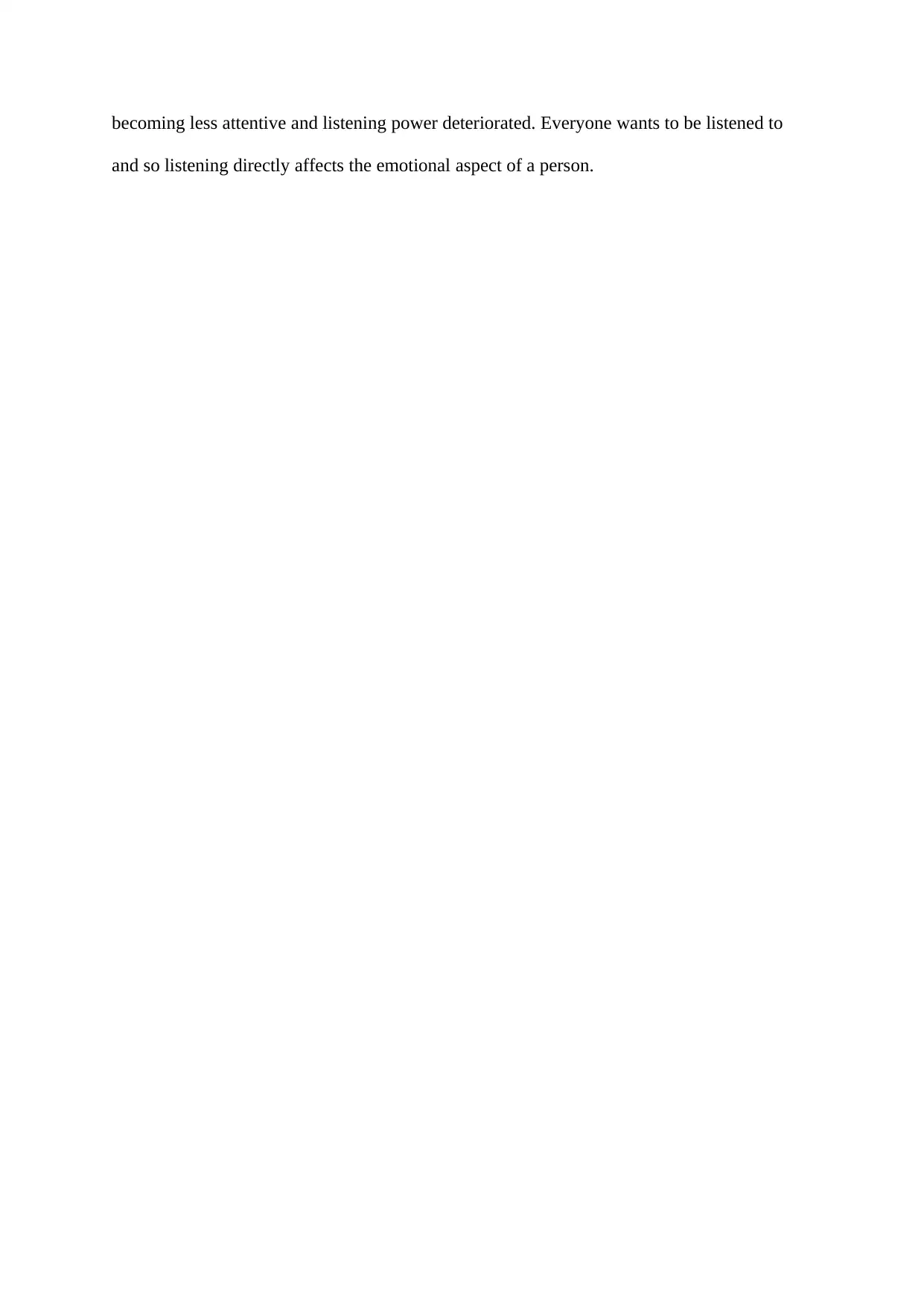
becoming less attentive and listening power deteriorated. Everyone wants to be listened to
and so listening directly affects the emotional aspect of a person.
and so listening directly affects the emotional aspect of a person.
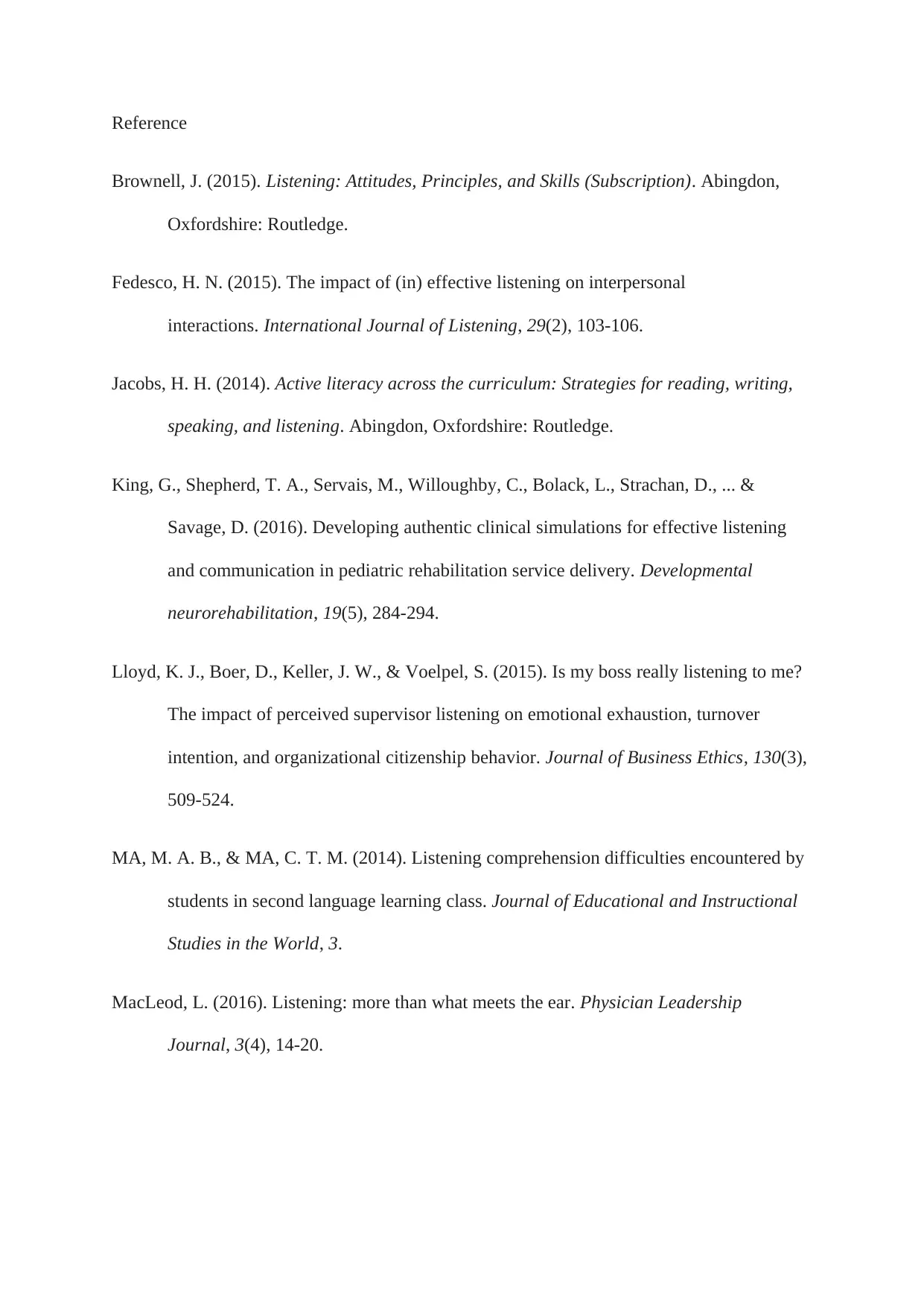
Reference
Brownell, J. (2015). Listening: Attitudes, Principles, and Skills (Subscription). Abingdon,
Oxfordshire: Routledge.
Fedesco, H. N. (2015). The impact of (in) effective listening on interpersonal
interactions. International Journal of Listening, 29(2), 103-106.
Jacobs, H. H. (2014). Active literacy across the curriculum: Strategies for reading, writing,
speaking, and listening. Abingdon, Oxfordshire: Routledge.
King, G., Shepherd, T. A., Servais, M., Willoughby, C., Bolack, L., Strachan, D., ... &
Savage, D. (2016). Developing authentic clinical simulations for effective listening
and communication in pediatric rehabilitation service delivery. Developmental
neurorehabilitation, 19(5), 284-294.
Lloyd, K. J., Boer, D., Keller, J. W., & Voelpel, S. (2015). Is my boss really listening to me?
The impact of perceived supervisor listening on emotional exhaustion, turnover
intention, and organizational citizenship behavior. Journal of Business Ethics, 130(3),
509-524.
MA, M. A. B., & MA, C. T. M. (2014). Listening comprehension difficulties encountered by
students in second language learning class. Journal of Educational and Instructional
Studies in the World, 3.
MacLeod, L. (2016). Listening: more than what meets the ear. Physician Leadership
Journal, 3(4), 14-20.
Brownell, J. (2015). Listening: Attitudes, Principles, and Skills (Subscription). Abingdon,
Oxfordshire: Routledge.
Fedesco, H. N. (2015). The impact of (in) effective listening on interpersonal
interactions. International Journal of Listening, 29(2), 103-106.
Jacobs, H. H. (2014). Active literacy across the curriculum: Strategies for reading, writing,
speaking, and listening. Abingdon, Oxfordshire: Routledge.
King, G., Shepherd, T. A., Servais, M., Willoughby, C., Bolack, L., Strachan, D., ... &
Savage, D. (2016). Developing authentic clinical simulations for effective listening
and communication in pediatric rehabilitation service delivery. Developmental
neurorehabilitation, 19(5), 284-294.
Lloyd, K. J., Boer, D., Keller, J. W., & Voelpel, S. (2015). Is my boss really listening to me?
The impact of perceived supervisor listening on emotional exhaustion, turnover
intention, and organizational citizenship behavior. Journal of Business Ethics, 130(3),
509-524.
MA, M. A. B., & MA, C. T. M. (2014). Listening comprehension difficulties encountered by
students in second language learning class. Journal of Educational and Instructional
Studies in the World, 3.
MacLeod, L. (2016). Listening: more than what meets the ear. Physician Leadership
Journal, 3(4), 14-20.
⊘ This is a preview!⊘
Do you want full access?
Subscribe today to unlock all pages.

Trusted by 1+ million students worldwide
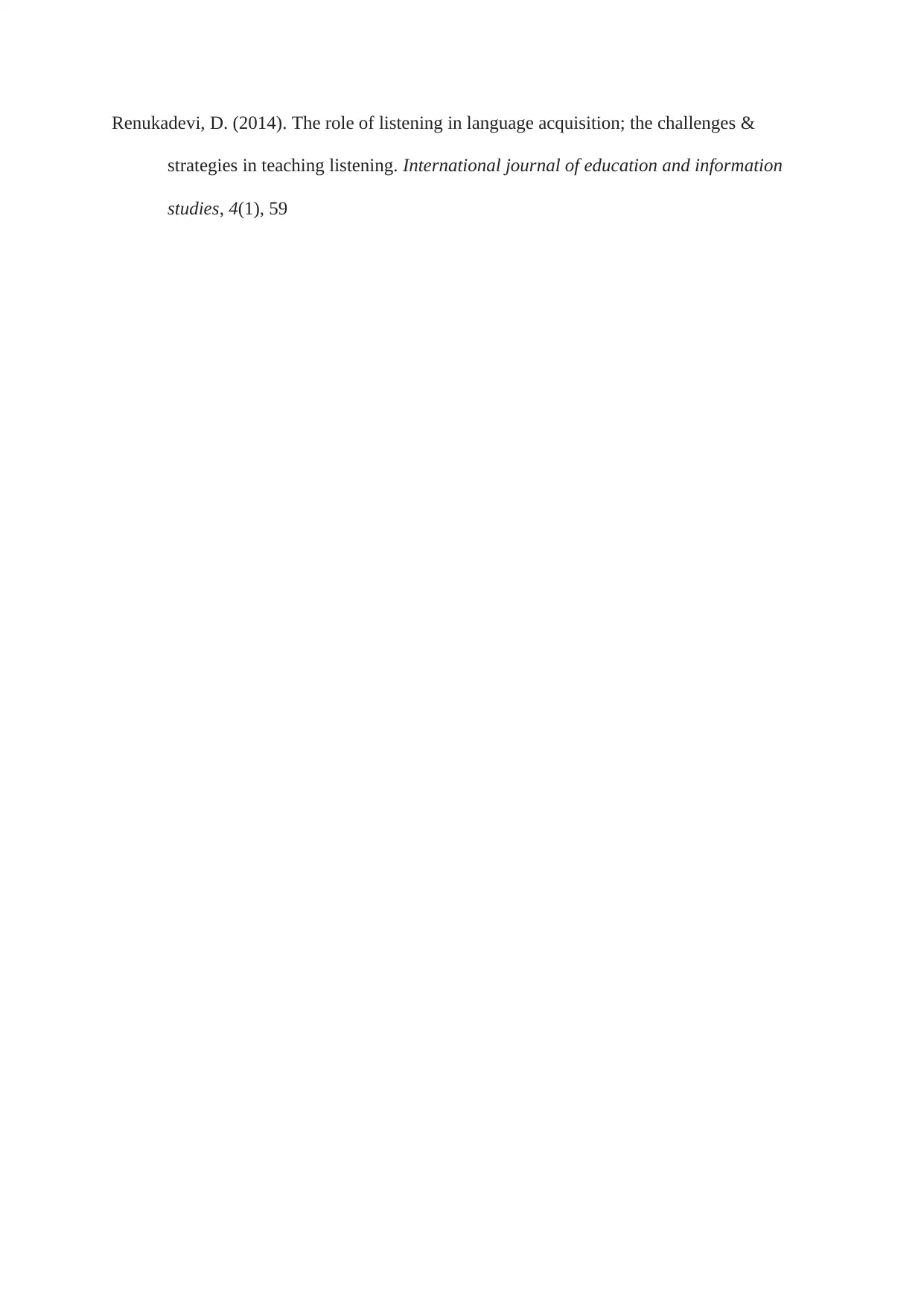
Renukadevi, D. (2014). The role of listening in language acquisition; the challenges &
strategies in teaching listening. International journal of education and information
studies, 4(1), 59
strategies in teaching listening. International journal of education and information
studies, 4(1), 59
1 out of 7
Related Documents
Your All-in-One AI-Powered Toolkit for Academic Success.
+13062052269
info@desklib.com
Available 24*7 on WhatsApp / Email
![[object Object]](/_next/static/media/star-bottom.7253800d.svg)
Unlock your academic potential
Copyright © 2020–2026 A2Z Services. All Rights Reserved. Developed and managed by ZUCOL.





